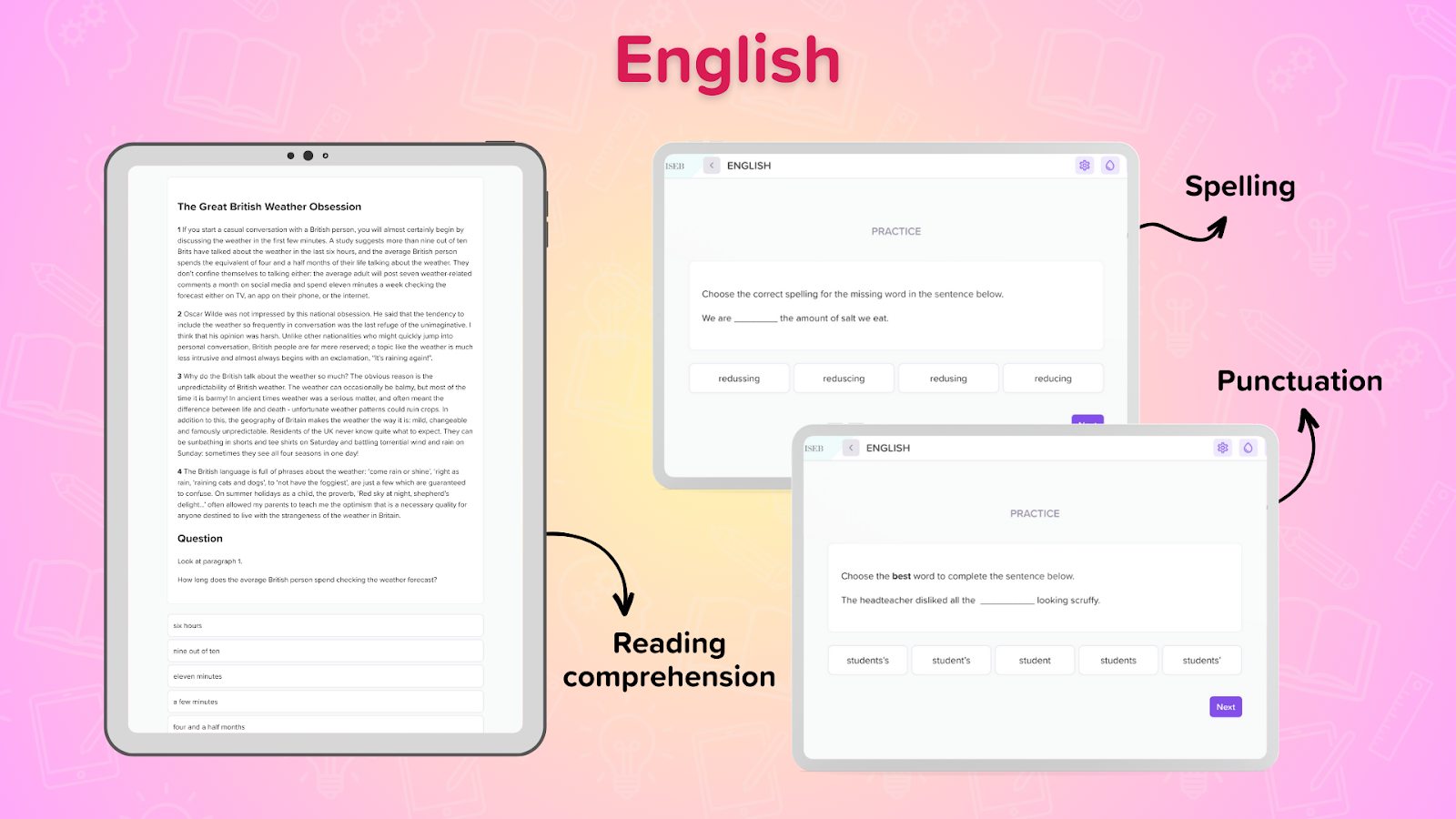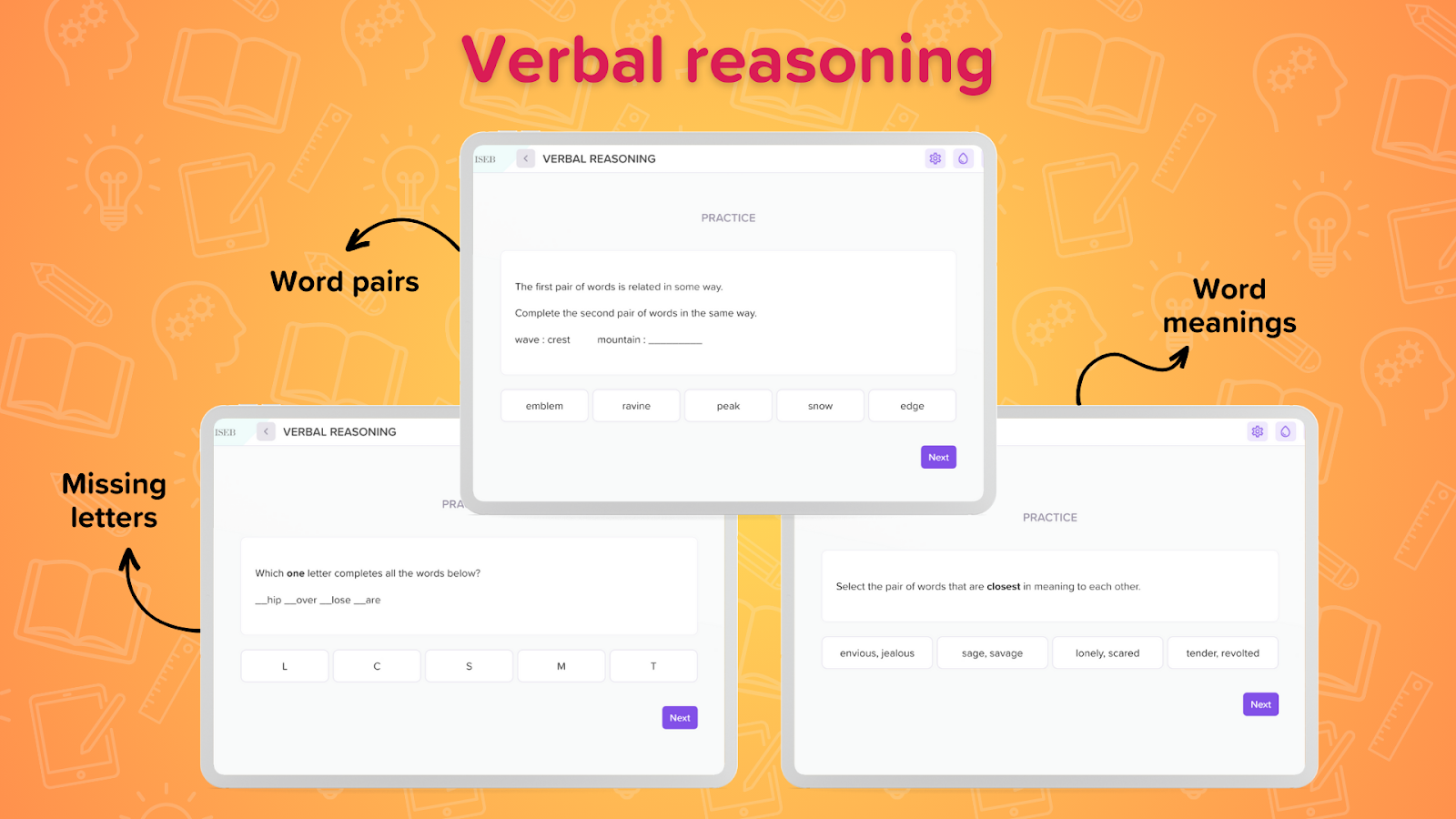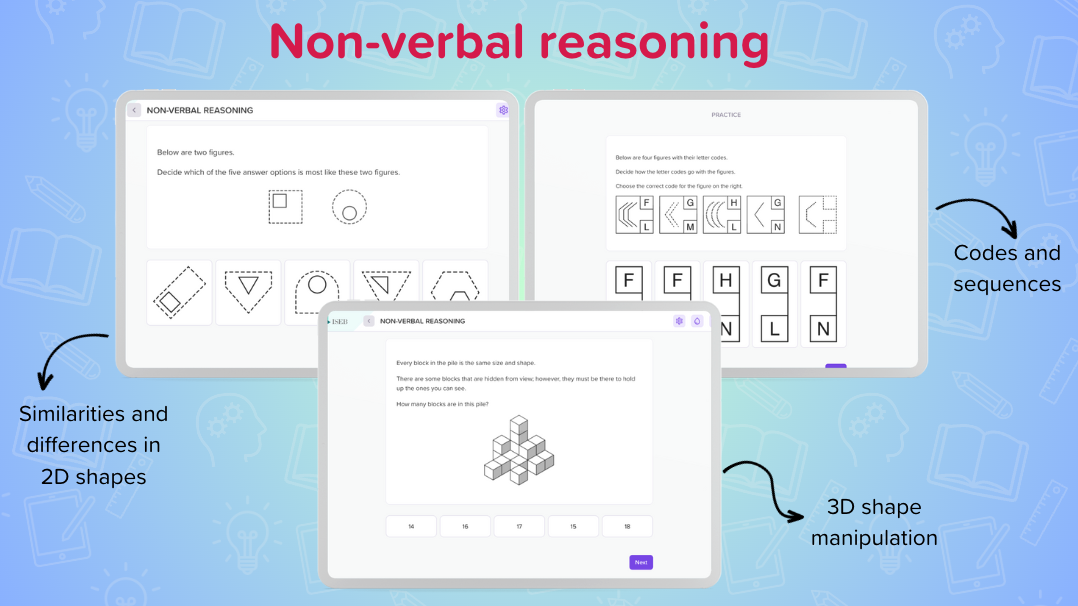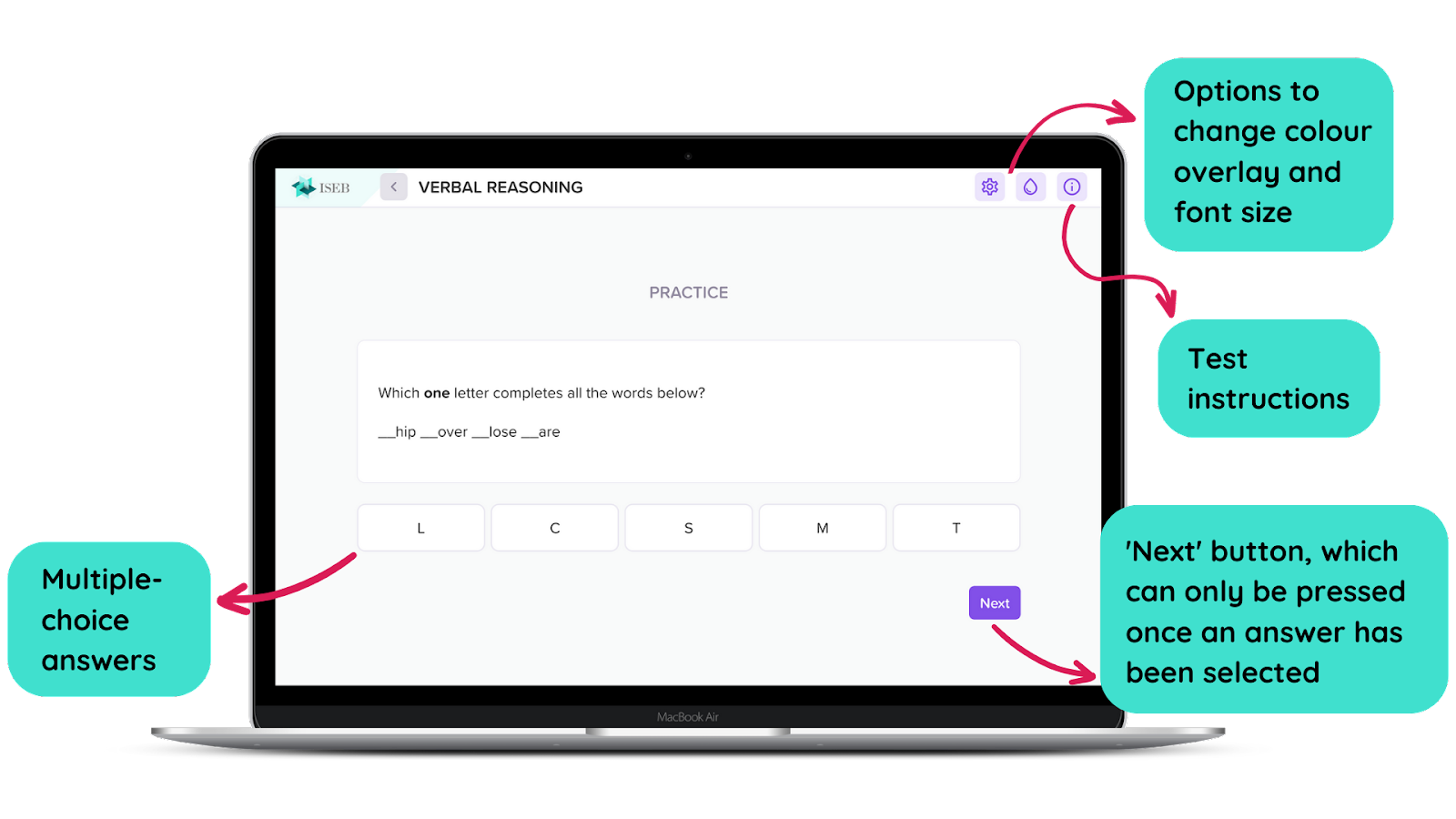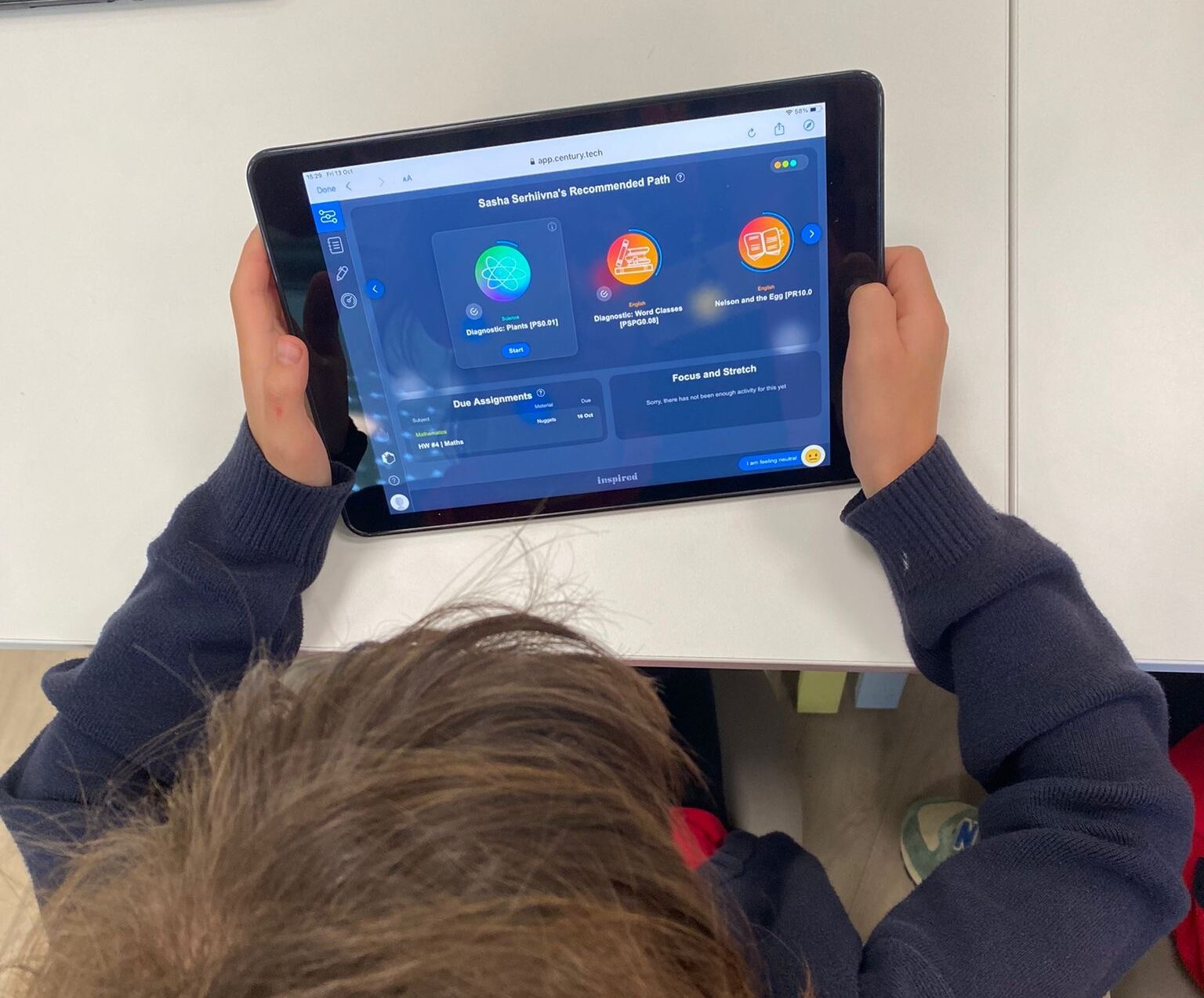Estimated reading time: 14 minutes
The ISEB Pre-Tests, or the ISEB Common Pre-Tests, is a pre-entrance test for some independent schools in England. If your child is planning to sit the test this year, we have prepared an ultimate parent guide with everything you need to know about the tests. Part 1 of our guide included information on the tests, a step-by-step look at the registration process, guidelines for SEND and EAL students, and how the scores are calculated.
The second part of our parent guide provides details below on the content of the tests, including topics covered, test preparation tips, and sample questions.
Structure of the ISEB Pre-Tests
The ISEB Pre-Tests consist of four different subjects: English, mathematics, verbal reasoning, and non-verbal reasoning. All four tests are adaptive and consist of multiple-choice questions only. They can either be taken across several days or in one session with short breaks in between each test.
The overall test should take a maximum of 2 hours and 15 minutes to complete. ISEB expect the standard duration of each test to be approximately as follows:
- English test: 40 minutes
- Mathematics test: 40 minutes
- Verbal reasoning test: 25 minutes
- Non-verbal reasoning test: 30 minutes
The Pre-Tests are adaptive, which means the questions will continually adjust to the most appropriate difficulty according to your child’s ability based upon their previous answers. As such, not every applicant will face the same number of questions, and some tests will vary in length, though there are no extra marks for answering more or fewer questions.
Each question requires a final answer as the test will analyse these in real time, so your child will not be able to return to previous questions once they have selected the answer. Questions cannot be skipped. Scores are calculated based on how accurately and consistently your child can answer questions of certain difficulties, and they are standardised by age.
What is covered in the ISEB Pre-Tests?
The Pre-Tests cover four subjects: English, mathematics, verbal reasoning, and non-verbal reasoning. Read our breakdown of what each paper covers below.
English
The English paper is based on the national curriculum, so the test will cover topics taught in class up to the end of Year 5. The paper is divided into two sections: reading comprehension and grammar.
Reading comprehension
This section consists of several short texts up to 500 words in length. These passages can include a range of genres and styles, including poetry, non-fiction, and fiction.
Each passage will be followed by a series of multiple-choice questions. Helping your child to build a diverse vocabulary and become familiar with literary devices and grammatical terms can be good practice to tackle these questions. Summarising chapters of books, articles or extracts from texts can also be useful for certain question types.
Grammar
This section emphasises your child’s understanding of grammar. For example, your child may be asked to identify if sentences are grammatically correct. As with the comprehension section, having a wide vocabulary is key to succeeding in this test. During their test preparation, ensure that your child can identify and define the following:
- Nouns, verbs and adjectives
- Adverbs
- Prepositions
- Prefixes and suffixes
- Clauses
- Sentence structure
- Punctuation
- Formal and informal sentences
- Spelling patterns and common exceptions
English test preparation tips
Reading is one of the most important activities your child can do to prepare for the ISEB Common Pre-Tests. Encourage them to read often, and include a variety of reading materials across different genres and eras. Keeping a vocabulary journal that lists down words new to them, along with their meanings, is very helpful to learn new words. Discussing what they’ve read can also help to develop key skills in summarisation and inference for the test.
To prepare for the English Pre-Tests, ISEB recommends using Bond Online Premium Plus, the only test prep platform endorsed by ISEB. Bond Online Premium Plus contains over 20,000 test practice questions across all four subjects to help your child prepare for and ace their entrance tests.
Mathematics
The maths test also covers topics in the national curriculum up to and including Year 5. Your child should revisit the following areas when preparing for the ISEB Pre-Tests:
- Numbers and place value
- The four operations (addition, subtraction, multiplication, and division)
- Fractions, decimals, and percentages
- Geometry
- Shapes and measurements
- Statistics and data
- Maths test preparation tips
Using an adaptive learning platform like Bond Online Premium Plus, which is powered by artificial intelligence, can identify the areas your child can improve while preparing for their maths test. The AI analyses their learning behaviours and recommends the right topics to learn next based on their performance. The platform also provides data insights about your child’s progress, which can help support shaping revision plans and practice sessions in the lead up to the tests.
Verbal reasoning
This paper assesses your child’s problem solving and logical thinking with language-based questions. This includes questions in vocabulary, word patterns, sequences, and logic.
Verbal reasoning test preparation tips
Since this is not a subject on the national curriculum, it is important to build your child’s verbal reasoning skills at home. Preparing for the English Pre-Test will equip your child with some of the basic skills required, such as reading and vocabulary. Additionally, doing word searches and playing word games like crosswords, Scrabble or Boggle can help develop capabilities in pattern recognition and problem solving.
If you prefer using practice questions to prepare your child for the test, Bond Online Premium Plus provides 2,000 test questions created by ISEB. There is a specific bank of verbal reasoning questions, and the AI will analyse your child's answers to enable targeted practice based on their strengths and areas they struggle with.
Non-verbal reasoning
The non-verbal reasoning paper is similar to verbal reasoning in that it assesses your child's logic and critical thinking abilities. The non-verbal reasoning test focuses on using visual figures and diagrams, however. The test will have two main question types:
- 2D diagrams and figures: recognising patterns, codes, similarities and differences
- 3D diagrams and figures: manipulating figures and visualising them differently
Non-verbal reasoning test preparation tips
ISEB has provided practice postcards for non-verbal reasoning on their Families Hub. Additionally, using educational games and activities is one of the best ways to develop non-verbal reasoning skills for the Pre-Tests. These include:
- Building blocks, like Lego, to enhance spatial awareness
- Jigsaw puzzles to improve visualisation and pattern recognition
- Visual games such as ‘spot the difference’ to help identify shapes and positioning
Bond Online Premium Plus also provides practice questions for non-verbal reasoning. As the only ISEB-endorsed test practice platform, the content provided is accurately aligned with the actual tests. Your subscription also gives you access to thousands of high-quality learning materials created by our team of expert teachers at CENTURY across all four subjects covered in the ISEB Common Pre-Tests.
How to prepare for the ISEB Pre-Tests
If you have not registered for the tests yet, learn more about the registration process and what to expect here.
Before the test, we recommend going through the ISEB Test Walkthrough with your child to familiarise yourselves with the test experience. When clicking into a test, specific instructions will be given for each paper. Ensure that you both read the instructions thoroughly before moving forward.
If your child has a visual impairment or difficulty with reading, they can adjust the screens with coloured overlays or bigger font sizes to improve their test experience. These instructions are always accessible by clicking the Information icon in the top right corner of the page. Learn more about the SEND guidelines for the ISEB Pre-Tests here.
Besides the test preparation tips outlined for each subject above, you should encourage your child to practise common test preparation techniques. These include time management, answering techniques, motivation, and stress management. Read more about our tips on keeping your child motivated for exams here.
All-in-one prep for the ISEB Pre-Tests
Although ISEB suggests that no special preparation is required for the Common Pre-Tests, practice can help you prepare your child to achieve their best possible result. ISEB do not sell any past papers, and suggest parents support children with games and activities at home.
ISEB also recommends dedicating more time to areas your child finds the most challenging. Finding those challenging topics is easier than ever before with Bond Online Premium Plus, which features questions created by the ISEB in line with the Pre-Tests framework. Bond Online Premium Plus uses advanced AI technology to analyse your child’s answers and learning behaviours, identifying where your child needs further practice and recommending the right next topic for them.
The platform contains thousands of questions modelled after the ISEB Pre-Tests in all four subjects, including verbal reasoning and non-verbal reasoning, which are not part of the national curriculum. These test practice questions can help your child familiarise themselves with the type of questions, how they will be presented, their difficulty levels, and how the test is scored.
Completing Pre-Test practice questions in all four subjects is also very good preparation for the test itself.
For more questions on the ISEB Common Pre-Tests answered, read the first part of our ultimate guide, or visit our FAQs for independent schools.
Find out more about how Bond Online Premium Plus can help your child succeed in the Pre-Tests on our website.


